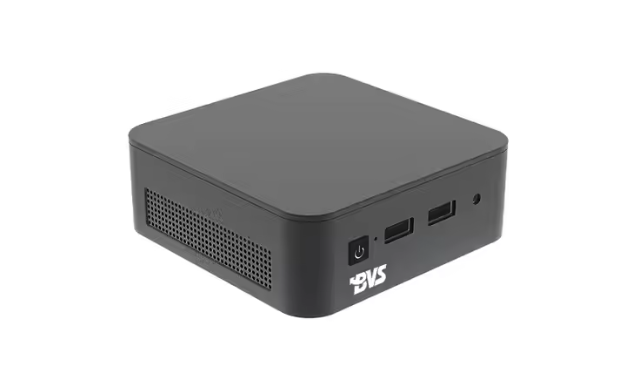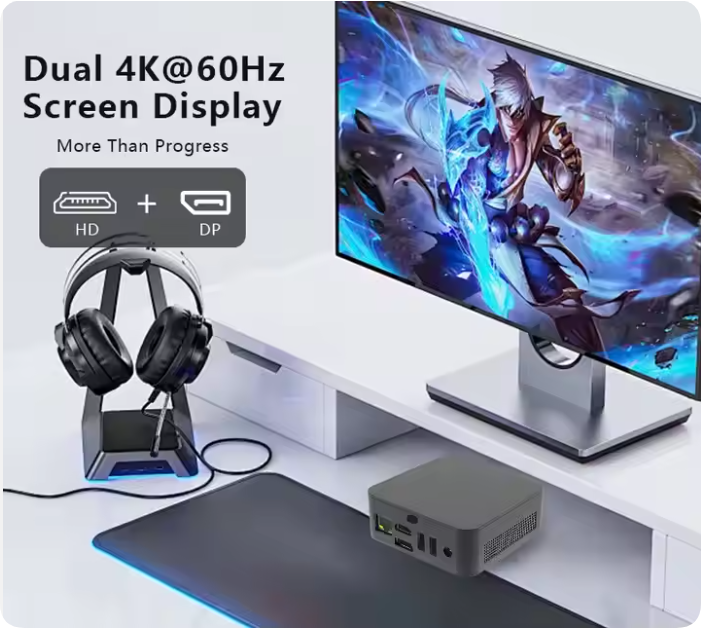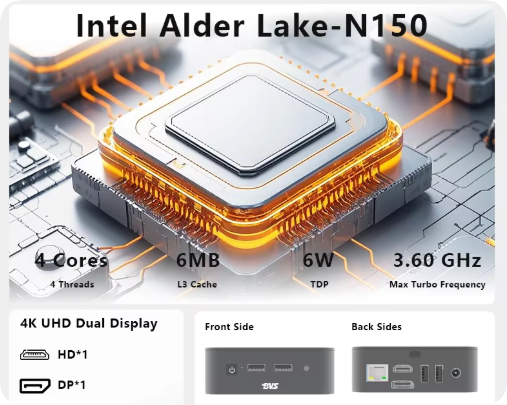The tech world is buzzing about mini PCs, and for good reason. These palm-sized powerhouses are redefining what it means to have a functional, portable computer. But are they right for you? Let’s dive into why mini PCs are game-changers, weigh their pros and cons, and help you decide if they’re worth your investment.
Why Mini PCs Are Disrupting the Market
Mini PCs have evolved from niche gadgets into mainstream contenders, thanks to advancements in processing power, energy efficiency, and design. Unlike bulky desktops or even laptops, they offer a space-saving footprint (often as small as 0.5 liters) while packing enough punch for everyday tasks and even specialized applications like AI-driven workflows. Modern mini PCs now integrate high-performance processors and neural processing units (NPUs), rivaling traditional desktops in capability while consuming far less energy.
Their rise is fueled by trends like remote work, smart home integration, and the demand for eco-friendly tech. For instance, replacing traditional desktops with mini PCs in large-scale environments—such as offices or classrooms—can lead to significant reductions in electricity consumption and operational costs.

The Upsides of Mini PCs
-
- Space Efficiency & Portability
Mini PCs are ideal for cramped spaces, minimalist setups, or mobile workstations. Their compact design allows them to fit seamlessly into environments where space is at a premium, such as dorm rooms, small offices, or even behind a monitor.
- Energy Savings
With thermal design power (TDP) as low as 10W–17W—compared to 100W+ for traditional desktops—mini PCs slash energy bills and reduce carbon footprints. This makes them an environmentally conscious choice for both individuals and organizations.
- Silent Operation
Many mini PCs utilize fanless cooling systems or advanced thermal management, operating at near-silent levels. This eliminates the distracting hum of traditional desktops, making them perfect for quiet workspaces or home theaters.
- Versatility
From serving as home entertainment hubs to powering edge computing projects, mini PCs adapt to diverse roles. They can handle tasks like 4K media streaming, light gaming, or even AI-driven applications, depending on their hardware configuration.
- Cost-Effective Entry Points
While high-end models cater to professionals needing desktop-grade performance, budget-friendly options provide an affordable gateway for basic computing needs like web browsing, document editing, and video conferencing.

The Downsides You Can’t Ignore
-
- Limited Upgradability
Most mini PCs sacrifice expandability for their compact size. Components like RAM and storage are often soldered or restricted to smaller form factors, limiting future upgrades. Users needing frequent hardware updates may find this restrictive.
- Thermal Constraints
Compact designs struggle with heat dissipation, especially under heavy workloads. High-performance processors may throttle performance unless paired with advanced cooling solutions, which can add to the cost or size of the system.
- Driver and Support Challenges
Some manufacturers lack robust driver repositories or long-term software support, leaving users vulnerable during operating system updates or troubleshooting. Choosing reputable brands with reliable customer service is crucial.
- Premium Pricing for High-End Models
Cutting-edge mini PCs with dedicated GPUs or specialized AI chips often come with a steep price tag, sometimes exceeding the cost of equivalent traditional desktops. This makes them a less viable option for budget-conscious users seeking maximum performance.
Who Should Consider a Mini PC?
-
- Office Workers & Students: Ideal for those needing a quiet, energy-efficient machine for tasks like document editing, video calls, or coding.
- Home Theater Enthusiasts: A compact alternative to media consoles, capable of streaming 4K content or running emulation software.
- Tech Minimalists: Perfect for decluttering workspaces without sacrificing functionality.
- Developers and Innovators: Useful for edge computing, IoT projects, or local AI applications due to their balance of power and portability.
- Avoid mini PCs if: You require high-end gaming, frequent hardware upgrades, or intensive tasks like 3D rendering without external GPU support. Traditional desktops or laptops may better meet these demands.
Final Verdict: Is a Mini PC Right for You?
Mini PCs are transformative for users prioritizing space, efficiency, and versatility. They excel in environments where portability and low energy consumption are critical, such as offices, classrooms, or smart homes. However, their limitations in upgradability and thermal management mean they aren’t a one-size-fits-all solution.
Before making a decision:
-
- Assess your needs: Determine whether your tasks require high-performance hardware or can thrive within the constraints of a compact system.
- Research compatibility: Ensure drivers and software support align with your operating system and applications.
- Prioritize cooling solutions: Opt for models with efficient thermal designs if sustained performance is essential.

Contact BVS - Your Mini PC Expert
The appeal of mini PCs lies in their ability to balance power and practicality. While they aren’t perfect for every scenario, their growing capabilities make them a compelling option for many users. By weighing their strengths and weaknesses against your specific needs, you can determine whether a mini PC aligns with your computing goals.
As a prominent seller, BVS presents a well - chosen collection of high - end Mini PCs. These Mini PCs are designed to offer you both powerful performance and an attractive style, all packed into a small and space - saving package. When you choose BVS, you can put aside any concerns about compatibility. Every Mini PC has undergone rigorous testing and verification to ensure seamless compatibility with the latest software. Moreover, with their reasonable price points, they are an excellent choice for those who are looking to upgrade their devices.
Choosing BVS is the right decision if you need something unique and compact.
